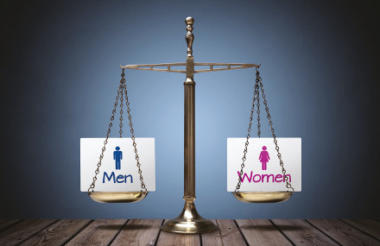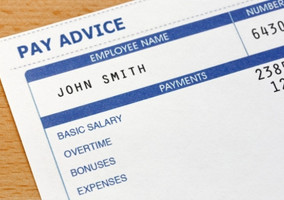One-third of large charities paused or halted reporting on their gender pay gap for 2019, according to analysis by Civil Society News.
Organisations with more than 250 employees are legally required to report their gender pay gap, both on their websites and through a government portal. However, last year enforcement was suspended in light of the pandemic.
Employers have a year to file their gender pay gap reports, which are supposed to be a snapshot of the workforce in early April. Therefore, some had already submitted their April 2019 figures when the pandemic struck in spring 2020, while others went ahead and did so afterwards.
Civil Society News looked at a sample of 100 large charity employers, using those that appear in the Charity Finance 100 and 250 Index rankings of charities by income.
When we carried out our research in April, 66 out of the 100 charities had filed their gender pay gap data for 2019.
Not all charities with the largest incomes are required to report their gender pay gap, because the requirement to complete a report only applies to organisations with more than 250 employees. However, all those in our sample had filed a gender pay gap report for 2018.
The Fawcett Society, a women’s membership charity that campaigns for gender equality and women’s rights, has previously urged all organisations to resume filing their reports.
Charities that did not file a report
Mandatory gender pay gap reporting was introduced in 2017. The 2019 report was the third set of data to be compiled and collected.
Of the 33 charities that had not filed their gender pay gap report via the government website, 13 made some details available via their own website or annual reports.
Sixteen told Civil Society News that they still intend to publish their gender pay data for 2019 and file it using the government portal, meaning there will not be any years missing from the data in the long term.
Two said they would not be completing their pay gap reports and 15 did not respond to a request for comment.
The Girls Day School Trust, which admitted that it would not complete a 2019 report, said in a statement: “Gender pay gap reporting is important and we are committed to playing our part in identifying and reducing the salary differentials between the sexes.
“However, as with most of the education sector over the past year, there continues to be a lot of pressures on our staff and demands on their time, and we are not preparing a report for 2019. We are confident that we have continued to make progress between 2018 and 2020.”
The National Autistic Society was the other charity which admitted that it does not expect to complete its gender pay gap report for 2019, saying that its staff had been under pressure during the pandemic. In 2018 its mean pay gap was 2.8%, well below the national average of 15.5%.
Pandemic pressures
All the charities that responded to our request for comment cited additional pressures placed on their charity to deliver more services at a time when income was severely curtailed.
Dorothy Brown, chief operating officer at the British Red Cross, said: “We’re grateful to the government for extending the deadline for gender pay gap reporting to allow organisations like ours, which have been on the front line of the Covid response, more time to report their findings. Addressing the gender pay gap and reporting on our progress both remain extremely important to us.
“We’re working towards publishing our 2019 and 2020 data before the end of August this year. We're also dedicated to understanding internally what other pay disparities and trends there are across other demographics, including race and ethnicity, and we continue to monitor government guidance on the publication of ethnicity pay gaps.”
Similarly, a Dogs Trust spokesperson said: “As with many other charities, the pandemic has had a significant impact on many of our core teams and their workloads. We’re committed to equal pay and we’ll be publishing our gender pay gap information as soon as we can and to meet the government’s reporting deadlines, which were extended for 2020 and 2021, acknowledging the exceptional circumstances over the last year.
“We're confident that salary decisions are made fairly depending on the requirements of each job, not according to gender. Our ambition is to recruit, develop and retain the best possible workforce to achieve our organisational aim of promoting dog welfare.”
Elsewhere, Shelter said it is now on track to file its 2020 report ahead of the deadline.
David Evans, director for people at Shelter, said: “Equality and diversity are integral to everything we do at Shelter, which is why we will be reporting on our gender pay gap for 2019 and 2020 as a priority later this month.
“Last year the requirement to report these figures was suspended due to the pandemic and the enormous pressure it put on organisational capacity. We are pleased to be in a position in 2021 where we can report on our gender pay gap early, ahead of the autumn deadline.”
ZSL (Zoological Society of London) is another charity that has missed this year’s deadline, and has committed to filing its all its data by October.
Helen Downton, head of human resources at ZSL, said: “The impact of Covid-19 and the subsequent lockdowns had a devastating effect on the charity in 2020 – forced to close its two zoos, its core income stream was cut off.
“Budget-relieving measures such as the government’s furlough scheme were utilised wherever possible to save costs, which meant that some outputs – including the GPG report - were delayed while those staff were not working.”
Scope, Sense, Tate Gallery VSO, Turning Point, MSI and Marie Curie are among those charities to have also delayed reporting due to the pandemic, but which said they would file the data by October.
Fawcett Society: ‘Government must signify to all employers that gender pay gap reporting is necessary’
This year gender pay gap reporting is mandatory, but the deadline has been extended. Organisations have until October to file their snapshot from April 2020.
In February the Fawcett Society launched a campaign demanding that the government reinstate gender pay gap reporting.
The charity warned that women had been disproportionately affected by the measures to get through the pandemic, such as having their hours cut or being placed on furlough. It feared that continued delays would make it harder to identify specific issues.
This week Felicia Willow, chief executive of the Fawcett Society, said: “We encourage all organisations who have not yet reported their gender pay gap data to do so. The government must signify to all employers that gender pay gap reporting is necessary and reinstate the April deadline next year.”
Employers in other sectors have also taken advantage of enforcement being suspended. Nine FTSE 100 companies stopped report, according to Tortoise.
Early reporters
Despite this year's deadline not falling until October, 30 of those in our sample have already filed their April 2020 data, and one, Teach First, has even filed its 2021 data.
RNLI is one of the charities to have filed and published its gender pay gap data for 2020.
In March, it announced that its mean gender pay gap was now -1.5%, meaning women at the charity, on average, earn 28p per hour more than their male colleagues.
Sue Barnes, people director at the RNLI, said: “We are absolutely committed to demonstrating equality for all our employees at the RNLI and value the many benefits that diversity brings our organisation.
“We actively promote awareness on inclusion and diversity for our staff and volunteers to help create an inclusive and supportive environment at the RNLI. We are proud to provide staff with a great place to work, equality for all and equal pay for equal work.
“We have a formal process of grading jobs at the RNLI to ensure rigorous decisions are made on job grades and rates of pay. Gender pay gap data is reviewed by our remuneration committee and actions to address gender pay gaps form part of our annual pay review cycle.”
The RNLI’s 2019 gender pay gap was -3.0% and its 2018 figure was -3.1%. The charity says changes are influenced by several factors such as the seasonal lifeguard start date and the date that Easter falls.
Related articles











